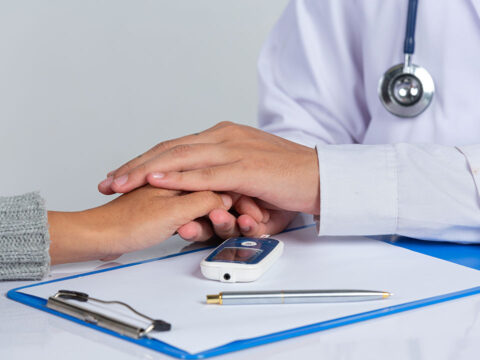
Simple Tips To Manage Diabetes And Protect Your Heart
December 8, 2021
Mothers’ Diabetes May Induce Premature Aging Of Neural Tissue Leading To Birth Defects
December 8, 2021Diabetes patients are often at a higher risk of many health complications, one of which is a heart attack. High blood glucose can damage the blood vessels and nerves in your heart, causing strokes and heart attacks. However, heart attacks are not always visible to people. Sometimes, heart attacks can also be silent, without any symptoms and can still yield grave consequences. This case is mostly seen in people with diabetes. Therefore, it is considered a serious threat to diabetes patients.
What Is A Silent Heart Attack?
Silent heart attacks are heart attacks that come without any warning signs and symptoms. Usually, the person experiencing it would not realise that they just had a heart attack. It may pass as a discomfort in the chest or heartburn. Therefore, silent heart attacks may remain undiagnosed for a long time.
How Does Diabetes Cause A Silent Heart Attack?
Diabetes can damage the nerves in your body and lead to diabetic neuropathy. Usually, diabetes neuropathy is experienced as numbness and weakness in the hands and feet. However, sometimes, high blood glucose levels can also damage the nerves in your heart, bladder and blood vessels. Due to nerve damage, you may not experience warning signs and symptoms of heart attacks such as pain and discomfort.
What Are The Warning Signs Of A Silent Heart Attack?
- The most important sign of heart attack is chest pain. You may experience mild pain, pressure, fullness or discomfort in the centre of your chest. It may seem like heartburn, but if you experience this sign persistently, you should contact your doctor immediately.
- The warning signs of silent heart attack do not only reside with the heart. They may be felt in other parts of the body as well. You may experience pain and discomfort in your back, arms, neck, stomach, etc.
- The most common symptom of having a heart attack is shortness of breath. In an episode of a stroke or a heart attack, your heart is not able to pump the blood properly, which causes difficulty in breathing. You may also feel dizziness and can even faint while experiencing a heart attack.
- Feeling nauseated and experiencing cold sweats is also one of the main signs of having a heart attack. These symptoms may feel like the flu. However, if your gut says that these symptoms are more serious, then consult a doctor immediately.
Is A Silent Heart Attack Ever Diagnosed?
Most of the time, it is not possible to understand that you had an episode if it was a silent heart attack. Therefore, it is very important to be aware of these warning signs. In the majority of cases, silent heart attacks are diagnosed when the patient goes to the doctor for any blood test. Therefore, it is recommended to go for regular checkups if you have diabetes, so your doctor can also diagnose any other complication.

What Are The Consequences Of Silent Heart Attacks?
A heart attack can severely damage your heart and the entire body. Silent heart attacks elevate the risk even more since they may remain undiagnosed and untreated for a long time. A silent heart attack can also increase the risk of getting another heart attack and even heart failure.
How To Prevent Silent Heart Attacks In Diabetes?
- Manage your diabetes efficiently. By controlling your blood sugar levels, you may prevent damage to the blood vessels and the nerves and reduce the risk of getting silent heart attacks.
- Eat a healthy and balanced diet at regular intervals of time. It is not only important to manage diabetes but also to boost the functioning of your heart.
- Maintain healthy body weight. Obesity increases the risk of getting heart attacks.
- Maintain your blood pressure levels and cholesterol levels. It will not only help to prevent heart attacks but also aid in the management of diabetes.
- Do not lead a sedentary lifestyle. Exercise regularly. Exercising helps to improve blood circulation in the body, eventually reducing the stress on your heart to pump more blood.
- Manage your stress with meditation and mindfulness. It will help to control your blood sugar levels and also boost your heart health.
- Quit smoking. Smoking can build plaque in your arteries and lead to heart attacks.
- Go for regular checkups. This will help your doctor diagnose any episode of silent heart attack as early as possible.
Takeaway:
If you have diabetes, you are more prone to getting silent heart attacks. Therefore, it is extremely important to manage your diabetes efficiently to prevent nerve damage and heart attacks. In addition, it is also important to remain aware of the symptoms of a silent heart attack to diagnose it at an early stage. It will help to prevent any further episodes of a heart attack.
References:
- https://care.diabetesjournals.org/content/29/3/692
- https://www.healthline.com/health-news/heart-attack-you-never-knew-you-had
- https://professional.diabetes.org/sites/professional.diabetes.org/files/media/Know_the_Warning_Signs_of_a_Heart_Attack.pdf
- https://www.mayoclinic.org/diseases-conditions/heart-attack/expert-answers/silent-heart-attack/faq-20057777
- https://www.pennmedicine.org/updates/blogs/heart-and-vascular-blog/2019/august/4-silent-heart-attack-signs
- https://www.niddk.nih.gov/health-information/diabetes/overview/preventing-problems/heart-disease-stroke
- https://www.healthline.com/health/type-2-diabetes/understanding-cv-disease-diabetes




